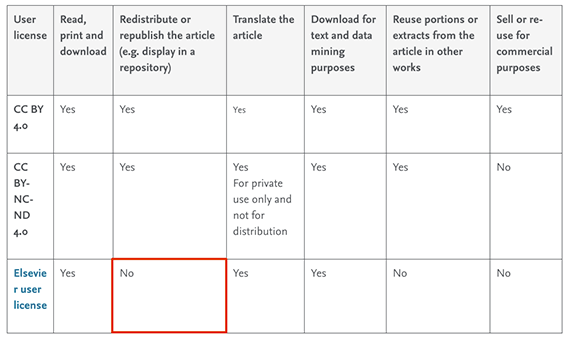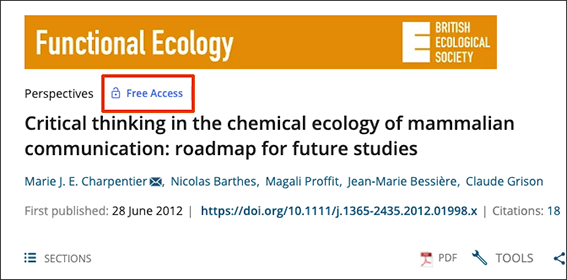You have downloaded your article from the website of the journal and you think that, since it is available free, you can deposit this published version in HAL. Well, sometimes it is true but …. sometimes it is not.
Does the mention « Open Access » or « Open » is included in your file? or a Creative Common license (CC-BY, CC-BY-NC, etc) ? If so, you can deposit this publisher’s version in HAL. You sometimes need good eyes to find the licence: in the Elsevier’s files, it is at the bottom of the first page (example); idem for the articles published by Oxford University Press (example). On the other hand, for articles in journals published by Nature Publishing Group and MDPI, the licence is on the last page of the file (example).
But if these mentions are not included in the file, you cannot deposit the published version without first checking if the publisher approves it.
For example, do you know that the articles available on Sciencedirect in Open archive are licensed under the Elsevier license? Users may read and download them, but not re-distribute by displaying them in an open archive. Everything is in the nuance …
Another example is the free access articles on the Wiley website: there is no licence associated with them, but the free access is a choice of the journal to promote the articles and this simply means that they can be accessed by the public for free.
There are certainly many more examples.
Some tools to help you
To help you checking, the indispensable data of Sherpa/Romeo is displayed in a simplified manner in the HAL deposit form. However this data is limited to journal articles. If it is mentioned « can with additional fee » for the published version, be careful. If no fees (the famous APC) have been paid for the article to be in open access, you should deposit the author’s version (postprint) instead.
You can also use the DOAJ (Directory of open access journals) to check if the journal you have published in is open access friendly, and DOAB (Directory of open access books) which indexes open access books.
Another useful tool that you can test, but only if your document (article or chapter) has a DOI identifier: How Can I share it. The search is done using the DOI and the tool shows what you can share (often it is only the metadata!) and how.
Finally, if you don’t have the time to check, the moderators are there to help you: they will tell you if you need the publisher’s explicit agreement to deposit and distribute the published version of your document.


